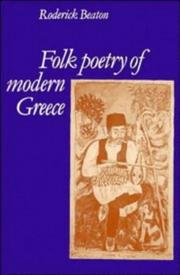| Listing 1 - 3 of 3 |
Sort by
|
Book
ISBN: 3445019290 Year: 1980 Volume: Heft 105 Publisher: Meisenheim am Glan : Anton Hain,
Abstract | Keywords | Export | Availability | Bookmark
 Loading...
Loading...Choose an application
- Reference Manager
- EndNote
- RefWorks (Direct export to RefWorks)
Folk poetry, Greek --- German poetry --- History and criticism --- Translations into German --- Translations from Greek --- -Folk poetry, Greek --- -Greek folk poetry --- Greek poetry --- -History and criticism --- Greek folk poetry

ISBN: 0511554133 0521228530 0521604206 Year: 1980 Publisher: Cambridge : Cambridge University Press,
Abstract | Keywords | Export | Availability | Bookmark
 Loading...
Loading...Choose an application
- Reference Manager
- EndNote
- RefWorks (Direct export to RefWorks)
A wide-ranging study of popular poetry and song in the Greek language from the last years of the Byzantine Empire to the present day. The folk poetry of the title includes the songs, composed and handed down by word of mouth, of unlettered villagers, of wandering minstrels with pretensions to professionalism, and, in more recent times, of the poorer inhabitants of Ottoman and Greek cities. The creative period of this folk poetry covers, at the minimum, 500 years of history and a geographical area stretching from Corsica in the west to Cyprus and Trebizond in the east, as well as northwards into the Balkans. This is not a general or theoretical survey of folk poetry, but an exploration, based on literary, historical and sociological evidence, of a single cultural tradition and the forces which have shaped it.
Folk poetry, Greek (Modern) --- Greek folk poetry, Modern --- Modern Greek folk poetry --- Greek poetry, Modern --- History and criticism. --- Arts and Humanities --- Literature
Book
ISBN: 9522227773 9522227781 9522222615 9789522222619 9789522227782 9789522227775 Year: 2016 Publisher: Helsinki : Finnish Literature Society / SKS,
Abstract | Keywords | Export | Availability | Bookmark
 Loading...
Loading...Choose an application
- Reference Manager
- EndNote
- RefWorks (Direct export to RefWorks)
"Words as Events introduces the tradition of short, communicative rhyming couplets, the mantinádes, as still sung and recited in a variety of performance situations on the island of Crete. Recently, these poems have also entered modern mass media and they are widely being exchanged as text messages by Cretans. Focusing on the multi-functionality of the short form, Sykäri demonstrates how the traditional register gives voice to individual experiences in spontaneous utterances. The local focus on communicative economy and artistry is further examined in a close analysis of the processes and ideals of composition. By analyzing how the "restrictions" of form and performative conventions in fact generate impulses of creativity, the author creates a theoretical approach that is sensitive to the special characteristics of the short, rhymed poetic traditions. In this interdisciplinary study, the reader is invited to become familiar with the current folklore theory of oral poetry, which has a long tradition in Finland. The author combines the results of earlier folkloristic and anthropological insights, and extends the theoretical concerns further to address questions of spontaneity and individual agency. The research data has been produced in communicative interactions during long-term fieldwork. As a result, the short, rhymed poetry, often neglected by scholars in earlier research paradigms, can now be seen in new light - specifically as dialogic poetry - through its extended, multi-layered dialogic qualities."
| Listing 1 - 3 of 3 |
Sort by
|

 Search
Search Feedback
Feedback About UniCat
About UniCat  Help
Help News
News